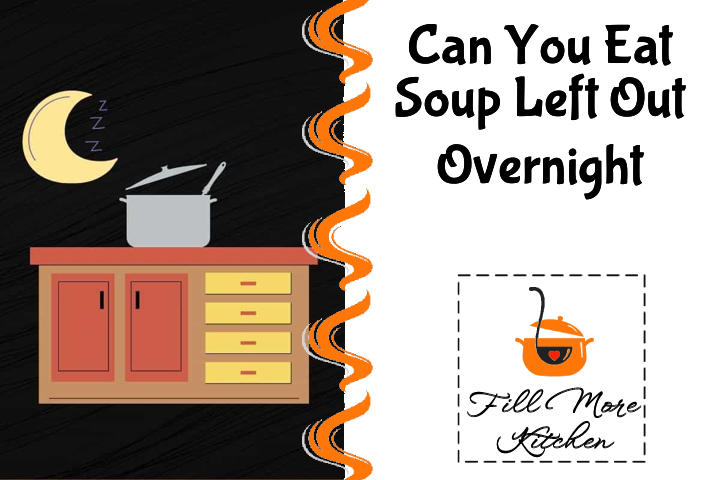During cold months, making a big batch of soup is an excellent way to have hot meals for several days. It can be reheated easily, and depending on the recipe, it can be either a light or hearty meal that keeps well.
On the other hand, cooling down a substantial quantity of soup takes a considerable amount of time, and refrigerating it while still hot is not advisable. If you prepare your soup in the evening, you may lack the patience to wait for it to cool down, prompting you to contemplate whether leaving it out overnight to cool is safe.
Similar to any other food, soup must not be left out overnight and should be cooled down either at room temperature or by placing the pot in a sink filled with cold water before being stored in the refrigerator as soon as possible. Reheating the soup to boiling point will not eliminate all harmful bacteria that have grown overnight.
If you are uncertain about the appropriate way to store soup, don’t worry! We will examine the dangers of leaving soup out and the most effective methods for cooling and storing it.
How Long Can You Let Soup Sit Out In Room Temperature?
When it comes to leaving soup at room temperature, the guideline is comparable to other cooked dishes, as you must aim to store any remaining portions in the refrigerator within two hours of removing your soup from the stove.
Despite the fact that soup that has been cooked in a large quantity takes more time to cool down than other cooked dishes such as stir fry or pasta, professionals still suggest that you throw it away if it has been left at room temperature for two to four hours.
When it comes to soup, which can have a wide range of ingredients, it’s important to trust your own instincts and be cautious about exceeding the two-hour limit for leaving it out.
Soups that contain seafood and meat have a higher likelihood of bacterial growth compared to soups made solely from vegetables, and storing soup in a cold kitchen reduces the risk of harmful bacteria growth compared to storing it in a warm kitchen.
Can You Leave Hot Soup Out Overnight to Cool?
Consuming soup that has been left out overnight is slightly less risky than eating any other cooked meal that has been left out for more than two hours, as cooling a large batch of soup can take a considerable amount of time.
However, it is advisable not to develop a routine of leaving soup out overnight. During warmer seasons, the danger increases as your kitchen will probably be warmer, and bacteria will grow at a faster pace.
During winter, when preparing a big pot of soup, cover it with a lid while it’s still hot to create a seal that will keep out any air containing bacteria and prevent contamination.
If it is safe and won’t attract animals, you can leave your pot of soup near a slightly open window or outside on the balcony or back porch.
Keeping your soup in a cool place is the most effective method to maintain its freshness, especially if you cannot wait for it to cool down sufficiently to refrigerate it overnight.
How Long Should Soup Cool Before Storing It in the Fridge?
As per the aforementioned details, it is generally advised to cool your soup within two hours before putting it in the refrigerator. Nevertheless, it should be noted that all soups are not made equal.
Several individuals tend to let a large quantity of soup cool for more than two hours before refrigerating it, including myself on occasion, but I believe vegetarian soups pose less risk.
If you are concerned about staying within the two-hour time frame for leaving food out, but you are hesitant to refrigerate hot soup, there are two straightforward choices available to you.
One way to ensure that your soup cools within the recommended time is by dividing it into smaller containers while it’s still hot.
If you plan your meals for the week and portion your soup accordingly, leaving it out overnight can be a convenient option to avoid reheating excess portions. Additionally, if you have limited fridge space, this method may be preferable.
If you want to cool your pot of soup quickly, you can fill your sink with cold water and add ice to it. Then, submerge the entire pot of soup in the cold water bath and let it cool for around thirty minutes to an hour.
Ensure that you fill your sink to a level of only half or 3/4 the height of your pot to avoid the possibility of pouring any water into your soup.
What Causes Bacterial Growth In Soup?
Bacteria growth flourishes in settings that have a significant amount of moisture and foods that are rich in protein, both of which can be used to describe soup.
Just like any other cooked food, bacteria can grow in soup left out overnight.
It is commonly believed that reheating soup to a boiling point can eliminate any bacteria that may have developed after being left out. This method is effective only if the soup is boiled for a minimum of ten minutes.
If you leave your soup out overnight, reheating it thoroughly before consuming can eliminate any active bacteria and neutralize the botulism toxin. Nevertheless, if your soup has been left out for more than one night, it provides ample time for bacteria to multiply to hazardous levels.
How Do You Know If Soup Has Gone Bad?
Just like any other food, you can determine if soup has spoiled or not.
One way to determine if food has spoiled is by detecting a change in its smell, which may become unpleasant even if there are no ingredients in the soup that would typically cause such an odor.
If you notice any visible presence of mold in your soup, it is a definite sign that the soup has gone bad and needs to be thrown away without delay.
If your soup is boiling without stirring or cooling, it may have spoiled. The same applies to significant turbidity or change in color.
If your soup has been refrigerated for more than a week or stored improperly, it may be advisable to dispose of it, even if there are no obvious indications of spoilage.
What Can Happen If You Eat Spoiled Soup?
Consuming spoiled soup can lead to various food-related diseases, which typically result in symptoms such as queasiness, retching, loose motions, abdominal pain, and high body temperature.
If you detect any unusual taste or difference in the flavor of soup, it is advisable to avoid consuming more of it, as it is always better to prioritize safety over regret.
You can also check this video about “Can You Eat Soup Left Out Overnight?”
Check out our 10 reviews!
Related posts
https://fillmorekitchen.com/things-you-shouldnt-put-in-a-slow-cooker/
https://fillmorekitchen.com/can-you-shop-at-costco-without-a-membership/
https://fillmorekitchen.com/can-you-run-an-empty-dishwasher-to-clean-it/
https://fillmorekitchen.com/can-you-pause-or-stop-a-dishwasher-mid-cycle/
https://fillmorekitchen.com/food-that-starts-with-the-letter-c/



